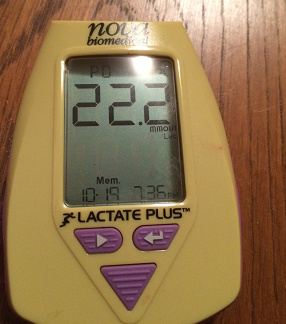I got a new blood test meter I use for running. And I bet nobody has seen one like it yet…
So first of all, it is not a BG meter. 

There will probably some diabetes in this thread, since it is somewhat of a tangent to what happens when lactate accumulates (spike city!). But primarily this is about running/exercise stuff for those interested.
This is the lactate meter which I recently got. And I have already learned a lot from using it.

I have mentioned lactate on FUD a few times.
(As a technical point, you sometimes here people use “lactic acid” and “lactate” interchangeably, but they are not the same thing. Lactic acid contains one additional proton and is not produced by the body at all during exercise.)
(Generally people say that lactate is only produced during anaerobic exercise, but I am learning that is not exactly 100% true either. That is also a bit of a fine point to distinguish, I’d like to share about that too.)
A couple of quick definitions:
- Glycolysis - the breakdown of glucose to release energy and pyruvic acid.
- Anaerobic- without oxygen
Lactate is produced by your body during exercise and serves as a fuel for your muscles. Anaerobic glycolysis is the transformation of glucose to lactate when limited amounts of oxygen are available. (makes sense, because anaerobic means “without oxygen”).
Here is the formula:
Anaerobic glycolysis - Glucose -> Pyruvate -> Lactate
And your body is able to reuse lactate for more energy, up until that point when you are working so hard the accumulation of lactate is too great
Okay, enough science blah, blah.
I tested a bunch of different times, under various scenarios.
I got a “Hi” reading once, which was exciting. And I got this 22.2m which was also great, because the meter only goes up to 25.0 mmol/L

The meter is much more tricky to use than a BG meter. You need a really hefty drop of blood. I mean, drop doesn’t really qualify. You need a LOT of blood compared to a normal BG meter.
And lactate dissipates very quickly when you stop running. So the cool thing for me is that I am used to testing while running, so I have done this at the end of the rep or mileage before I stop running. And I bet of all the thousands of athletes and coaches doing this type of testing, there are probably not a lot of them (if any) that are doing it while still running. No, in fact I bet none of them are doing it while running like I am doing! So +1 for the diabetic. 
Anyway, if there is interest in this sort of topic, let me know and I can discuss some of the cool things about it.



